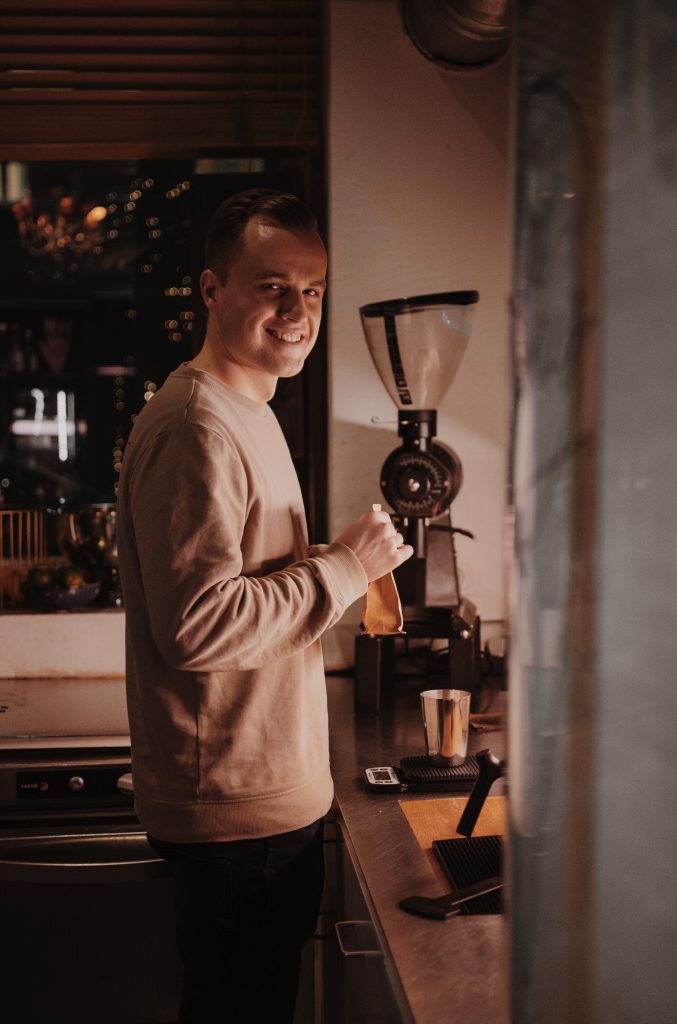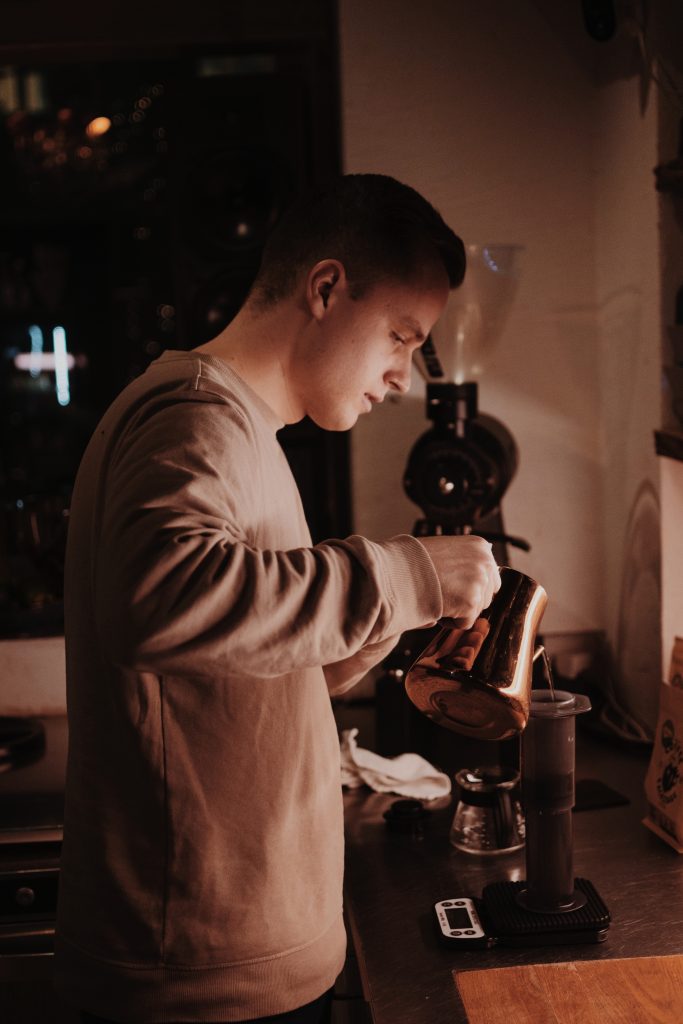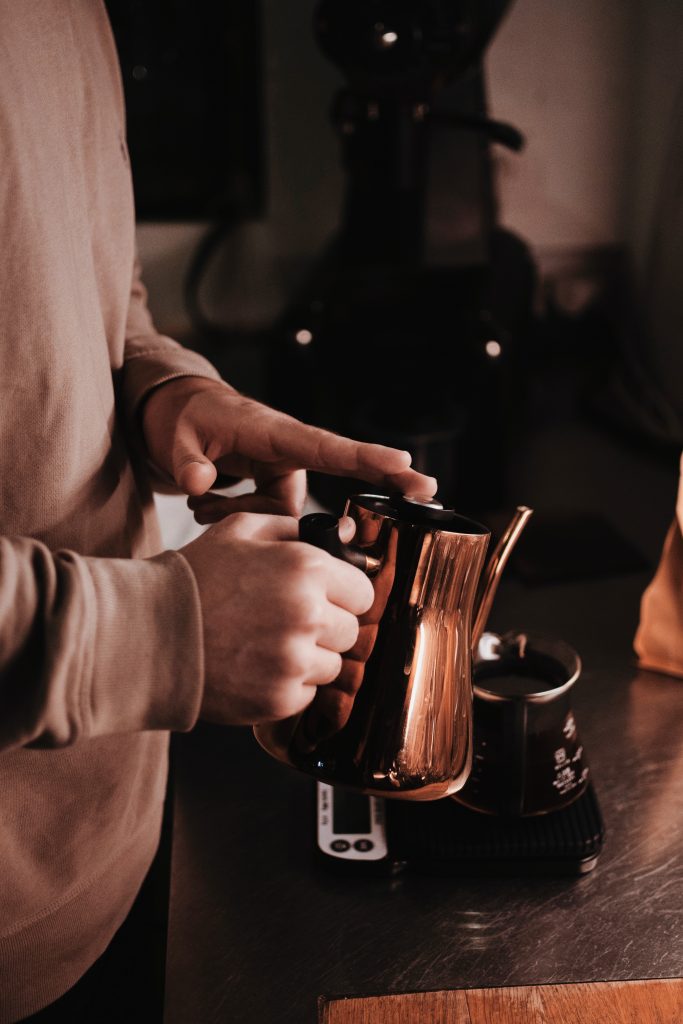My Vilnius introduces you to people for whom the city has become the place they call home. It’s all about the ordinary lives of extraordinary people and vice versa. These stories cover their favourite hidden gems and sights, as well as detours and discoveries in life.
For many, a cup of coffee is a habit and an inseparable part of their morning. But, for Joshua Fraser, it’s an immersive process requiring a high level of attention to detail and appreciation for every step along the way.
Working in fraud prevention by day, the rest of Joshua’s time is occupied by his passion—coffee brewing. Moving to Vilnius, exploring cafés, and learning about cultural nuances, it’s all wrapped up in our conversation below.
VP: Tell us a bit about yourself—what’s your background?
Joshua: I was born in Edinburgh, Scotland. My entire family are British but from the age of three I grew up in a German city called Paderborn. My father moved there for work and sent me to a German kindergarten and school, so I was raised with both British and German cultural influences.
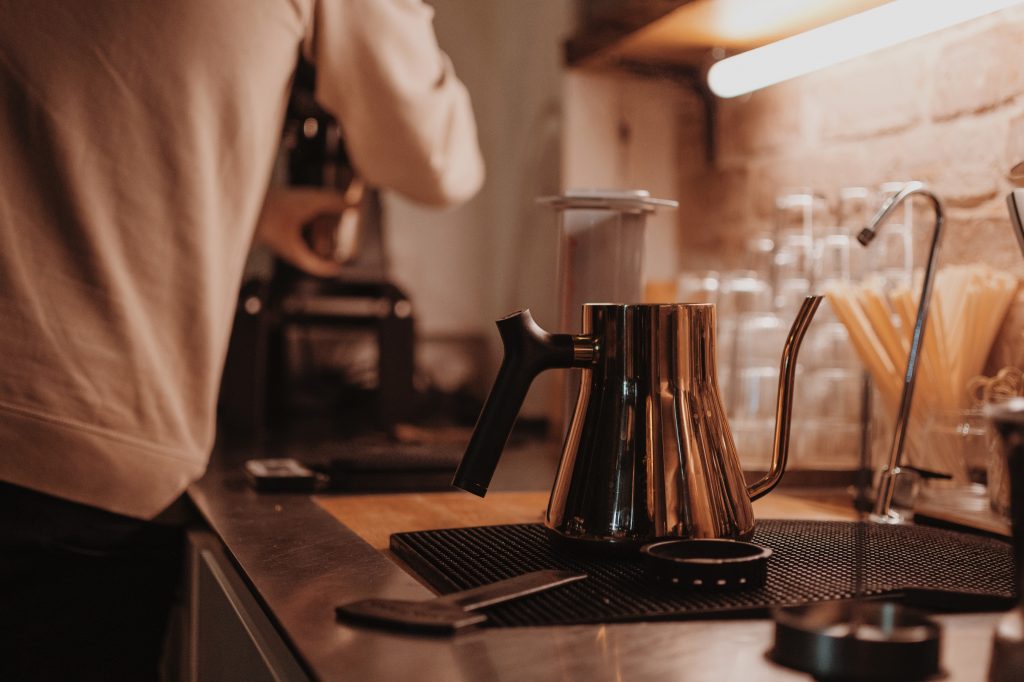
After I graduated from highschool, I spent five years in the Netherlands completing my Bachelor’s and Master’s degrees in Political Economy. Living in Amsterdam also helped foster my love of coffee, as the speciality cafés are where I would go to study and meet up with friends. University is where I met my partner. She’s Lithuanian, hence why I now live and work in Vilnius.
VP: When did you get into coffee?
Joshua: I remember being a kid in our family kitchen and my dad drinking coffee regularly. He had this beautiful blue ceramic coffee grinder that he used most mornings to grind coffee for his Moka Pot. I must have been about 8 or so at the time but I was not drinking coffee of course. That’s one of my earliest coffee memories, just watching the brewing process and smelling the coffee.
It wasn’t until I was around 15 that I started drinking coffee myself, so ten years ago. I also started brewing with a Moka Pot, ordering different pre-ground coffees and trying them out. I knew nothing about specialty coffee or the industry as a whole. But it was fun and an interesting thing to learn more about.
I think that is one of the beautiful things about the coffee community. It does not matter if you are an expert or a professional. As long as you enjoy drinking coffee everyone is welcomed with open arms. People are just excited to share the same passion. There is no pressure to be the best or most knowledgeable.
VP: Do you have a daily routine? If yes, what’s it like?
Joshua: This tends to surprise people, but I don’t drink coffee every day. Because I brew coffee manually using a hand grinder and a pour-over dripper like a V60, Kono, or Origami, it takes me a decent amount of time to prepare, brew, drink, and clean up everything. I also prefer to take my time because I enjoy the brewing process and drinking coffee for the taste, not to wake myself up.
Given my work schedule, I therefore brew coffee 2-3 times between Monday and Friday and more regularly on weekends. So there is no daily routine per se, but there is a brewing routine. I usually choose the coffee I want to brew that particular day and get the grinder, brewer, server, and cups from the cupboard.
I tend to choose between lighter, more fruity and floral coffees and darker, more chocolaty and sweet coffees. There’s no right or wrong choice, it just depends on what mood I’m in. I then grind 15 grams of coffee in my Comandante grinder, while the water boils.
I wet the filter paper, add the coffee to the brewer, and pour the water. I find the process of brewing coffee very relaxing as it requires you to be immersed in that moment with no distractions even if it is just for a few minutes.
VP: What’s the most memorable cup of coffee you’ve ever had?
Joshua: This is a very hard question. There are so many different varieties of coffee with different flavour profiles and interesting origins. In general, I think I was surprised when I first started exploring coffee, that the drink itself can be so flavourful—nutty, fruity, sweet, acidic, creamy, floral. I almost couldn’t believe that it was all-natural and contained in the bean itself.
If I had to pick the most memorable coffee that surprised me the most, it would be the El Paraiso Lychee Lot from Colombia. This coffee is a Caturra variety arabica coffee that was processed through a Double Anaerobic Washed method. It was roasted by Glitch Coffee and Roasters in Tokyo and had tasting notes of peach and lychee. This coffee was different to anything I’d tried before. It was the most intense smelling coffee and had a distinct taste of lychee.
Since then I have tried many coffees from El Paraiso, a Colombian coffee farm run by Diego Bermudez, and they have become one of my favourite coffee producers to buy beans from. That was definitely the most memorable coffee I’ve tried, but not the best.
The best coffee I ever tried was Takesi Geisha roasted by Coffee Collective in Denmark. Geisha is a special arabica variety coffee that has a flavour profile like a very delicate floral tea. This one, in particular, was grown at Finca Takesi, in Bolivia, at 2.600 meters above sea level. It had notes of honey, jasmine, and lemon with a great balance of sweetness and acidity. That was definitely the best I’ve ever tried.
Every specialty coffee can tell a story, from the producers and the bioclimate of the farm to the processing, roasting, and brewing method. Not everyone wants or needs to know everything about each element of the industry. But if you want to find them, there are amazing people and stories all over the coffee world.
VP: Where do you go for a morning coffee, after-work drink and Sunday brunch?
Joshua: I love Taste Map, located at M. K. Čiurlionio g. 8 in Vilnius. I get Flat Whites and Espressos there regularly. They also have a great selection of coffee beans from different origins. I also really like Backstage Cafe, in particular their roastery location at T.Ševčenkos g. 16h in Vilnius. They have great coffee and great food. Breakfasts, lunches, buns and more.
Those are definitely my top two coffee places. If by after-work drink you mean more than just coffee, I really like The Whisky Shop & Bar by Duoklė Angelams. They have awesome cocktails and are really worth checking out!
VP: Every country is unique and has its quirks; what are some things that you have learnt about Lithuanian culture?
Joshua: Lithuania is a really interesting and beautiful place. As someone who did not know a lot about the country until recently, there are a lot of things to explore and learn more about. For me, Lithuanians come across as friendly, open, and humble people. I’ve always felt welcomed and accepted even though I do not speak the language.
I also think that Lithuanians are more connected to nature than some other cultures. There are beautiful parks in the cities, sights in the countryside, and nature reserves close to the Baltic Sea. The culture seems to feel more connected to this side of life, resulting in more active and creative people.
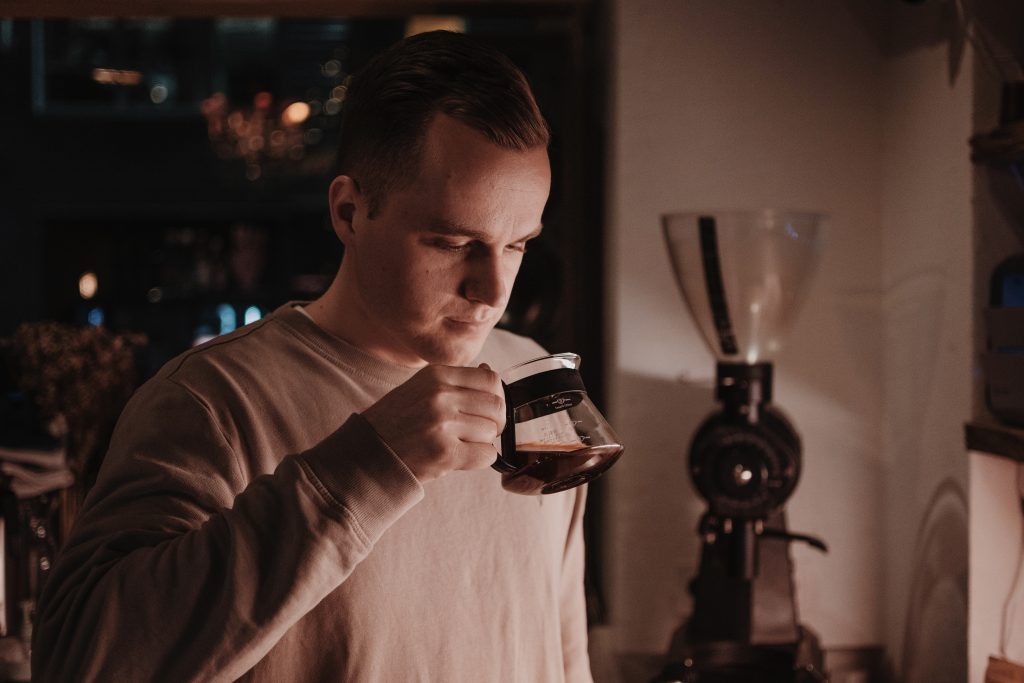
These are some of the impressions I’ve gathered so far. I’m sure the longer I live here the more I will learn and understand about Lithuania.
VP: How does the coffee scene here differ from other countries?
Joshua: The coffee scene in Lithuania is much more developed than I expected. There are really nice cafés and a great selection of beans. There are also very talented baristas, roasters, café managers, and event organisers. The passion Lithuanian people have for their hobbies and interests can definitely be found in the coffee industry.
At the same time, due to the price of expensive coffees and the average salary in Lithuania, some coffees and equipment are not available here. Generally, you find coffee in 250-gram bags for €8 – €12. This seems to be the accepted price range at which people in Lithuania are still willing to buy coffee.
In other countries this range can be higher, resulting in a larger selection of more diverse and high-quality beans. These can cost anything from €25 – €50 per 250 grams and beyond. While these beans are not necessary to have a good cup of coffee, this more restricted supply is something that points towards the coffee scene in Lithuania still having room to grow I think.
As the demand for coffee increases and more people brew coffee at home, the availability of higher quality beans and equipment will increase too. From what I’ve seen, this growth is already taking place and it will be very exciting to see how the coffee industry in Lithuania develops over the next 10 years.
VP: Where can we find you in the digital sphere?
Joshua: You can find me over on Instagram @fraser.coffee. I’m always open for a chat so if you have any questions or tips on where I should visit in Lithuania, feel free to message me.


